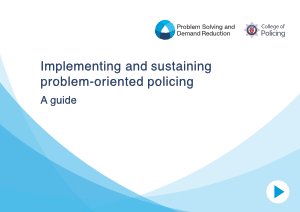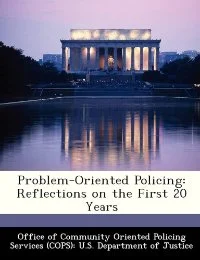Michael S. Scott
In the last three decades, several concepts have been advanced to structure efforts to improve policing. Among them have been team policing, neighborhood policing, community policing, problem-oriented policing, and, most recently, quality-of-life policing. With much overlap, each concept, as reflected in its name, emphasizes a different need, relegating other commonly advocated reforms to a secondary role, shaped to support that need. This volume traces the efforts to implement problem-oriented policing.
The emphasis in problem-oriented policing is on directing attention to the broad range of problems the community expects the police to handle–the problems that constitute the business of the police–and on how police can be more effective in dealing with them. A layperson may think this focus elementary on first being introduced to it. Indeed, laypeople probably assume that police continually focus on the problems they are expected to handle. But within policing, this focus constitutes a radical shift in perspective.
Problem-oriented policing recognizes, at the outset, that police are expected to deal with an incredibly broad range of diverse community problems–not simply crime. It recognizes that the ultimate goal of the police is not simply to enforce the law, but to deal with problems effectively–ideally, by preventing them from occurring in the first place. It therefore plunges the police into an in-depth study of the specific problems they confront. It invites consideration of a wide range of alternatives, in addition to criminal law, for responding to each specific problem. Thus, problem-oriented policing draws the police away from the traditional preoccupation with creating an efficient organization; from the heavy investment in standard, generic operating procedures for responding to calls and preventing crime; and from heavy dependence on criminal law as the primary means for getting their job done. It looks to increased knowledge and thinking about the specific problems police confront as the driving force in fashioning police services.
This publication was supported through Grant #98CKWXK052 from the Office of Community-Oriented Policing Services, U.S. Department of Justice. The opinions expressed herein are the author's and do not necessarily represent the official position of the U.S. Department of Justice. October 2000. 46p.







